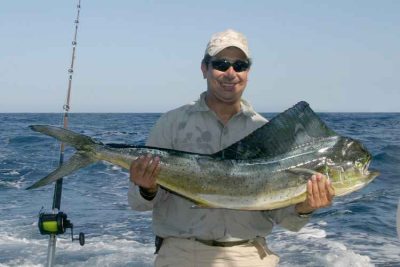The “ing form” refers to verbs when they end in the letters “ing”
Example for the verb “fish”, the ing form is fishing
When is the ing form used?
There are 3 main uses of the ing form in English grammar:
Continuous tenses
Examples:
I am fishing. (present continuous tense)
He was fishing. (past continuous)
We will be fishing. (future continuous)
As an adjective
For certain verbs, the ing form is in fact a present participle and is used exactly like an adjective.
When used like this, the -ing adjective expresses the source or cause of a feeling or emotion.
Examples:
verb: “interest” > interesting
The book is very interesting.
Verb: “frighten” > frightening
The horror film was very frightening.
As a gerund
A gerund is when a verb is used like a noun. It can then be used as the subject of the sentence or the object of the sentence.
Examples:

Fishing is my favourite hobby.
(fishing is acting as a noun. Here it is the subject of the sentence and the main verb is the verb “to be”.)
I like fishing.
(fishing is acting as a noun. Here it is the object of the verb “like”.)
Spelling rules of the ing form
In this section, you will learn the grammar rules for how to spell the ing form for different types of regular and irregular verbs.
Most regular verbs
Add -ing to the base form:
sing > singing
carry > carrying
drink > drinking
Verbs ending in silent -e
Delete the -e and add -ing
observe > observing
write > writing
explode > exploding
Verbs ending in -ie
Change the -ie to -y and add -ing
tie > tying
die > dying
Verbs ending in -ee
add -ing
free > freeing
see > seeing
Verbs ending in -c
add -king to the base form.
mimic > mimicking
panic > panicking
Verbs ending in a single vowel and a single consonant (except -w -x -y)
for 1 syllable verbs:
Double the consonant and add -ing
run > running
cut > cutting
sit > sitting
for 2 syllable verbs (except verbs ending in -l):
If the 2nd syllable is stressed:
double the consonant and add -ing
admit -> admitting
commit -> committing
If the 2nd syllable is NOT stressed:
add -ing
target > targeting
visit > visiting
EXCEPTION for 2 syllable verbs ending in -l
In British English:
double the -l and add -ing
cancel > cancelling
travel > travelling
In American English:
Use the normal rule for 2 syllable verbs (see above):
cancel > canceling (because the 2nd syllable is not stressed)
travel > traveling (because the 2nd syllable is not stressed)
Video lesson
Below is a video lesson explaining ing verbs with more information and examples.
There are over 100 English video lessons on the Crown Academy of English YouTube channel.


Qaissar says
Thanks for all team membres Who contribute giving useful knowledge and distribute enough culture…in terms of this section
Qaissar says
I thanks you about tour efforts
alpa says
Thank you Andrew . its really helpful